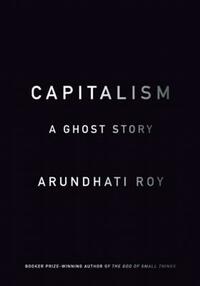Take a photo of a barcode or cover
A collection of clear-sighted and essays, Capitalism: A Ghost Story isn't a book about capitalism alone. Rather, it is a series of observations about the whole nest of institutions revolving around capitalism, the "war on terror", and "democracy", and how they have shaped the lives of people in the modern world, India in particular. The role of governments, international organizations, and NGOs in promoting the agenda of money and capital at the expense of vulnerable populations is exposed in stark light.
Roy's focus on her native India means that a lot of the political specifics she refers to (the names of leaders, parties, and corporations, and their particular histories) are obscure to American readers. But the ghost should be familiar to any resident of an ostensible democracy, with its cold chains of warmongering, soulless conformity, and callous disregard for an impoverished majority. The final chapter, from the text of a speech she made regarding the American Occupy movement, is a call to arms against capitalist greed in all nations.
It is not easy to convince someone of the inherent evil of capitalism. Either its crimes shock the conscience enough to prefer an alternative, or they don't. Either deadly inequality is a detestable blight, or it is an acceptable price for the comforts of a privileged few.
Roy's focus on her native India means that a lot of the political specifics she refers to (the names of leaders, parties, and corporations, and their particular histories) are obscure to American readers. But the ghost should be familiar to any resident of an ostensible democracy, with its cold chains of warmongering, soulless conformity, and callous disregard for an impoverished majority. The final chapter, from the text of a speech she made regarding the American Occupy movement, is a call to arms against capitalist greed in all nations.
It is not easy to convince someone of the inherent evil of capitalism. Either its crimes shock the conscience enough to prefer an alternative, or they don't. Either deadly inequality is a detestable blight, or it is an acceptable price for the comforts of a privileged few.
“The NGO-ization of politics threatens to turn resistance into a well-mannered, reasonable, salaried, 9-to-5 job. With a few perks thrown in. Real resistance has real consequences. And no salary.”
Roy further expands on the role of NGOs, corporate funding, and the flow of international capital in this short but highly informative collection of essays. The collection focuses mainly on disproportionate wealth in India, and how the wealthy manipulate the government, manipulate the media, manipulate the message, and so on. In addition, there are several case studies focusing on American occupation in Afghanistan and tying that in with the rise of the global market. Very interesting and I can’t wait to find out more information.
Roy further expands on the role of NGOs, corporate funding, and the flow of international capital in this short but highly informative collection of essays. The collection focuses mainly on disproportionate wealth in India, and how the wealthy manipulate the government, manipulate the media, manipulate the message, and so on. In addition, there are several case studies focusing on American occupation in Afghanistan and tying that in with the rise of the global market. Very interesting and I can’t wait to find out more information.
This was an interesting little book. It combined Roy's signature lush prose with hard-hitting nonfiction writing, which made for an unusual combination. 3.5 stars.
As the preface suggests, the book is a lacerating punch back against the severe inequality and violent injustice due to the effects of capitalism. And of course just using the word “capitalism” can seem general and vague, but the demands of capitalism as we know entails a great amount of intervention into aspects of social and political spheres in the interest of corporate profit. It’s sinister. And when we look at the human cost.. it’s frankly evil.
She starts off with an image of the biggest house in India, called Antilla, that’s owned by the richest man in India called Mukesh Ambani. It cost US$1 billion & has a staff of 600 to upkeep. It has six floors of parking space, 27 floors in total, three helipads & nine lifts. At the same time this building exists, 80% of people living in India subsist on US$0.50 or less!
She reveals the intricate connections between endowed organizations, NGOs, and the effect they have in politics. All of the power being enacted here is done through the exchange of money, and the tacit, soft power approach of deciding what gets to be considered as “acceptable” in the realm of political stance and charity. NGOs or groups that are working on more “radical” projects or causes do not get funding, are marginalized, and some eventually are unable to continue. All the while, the limits of conversation or how we think about resistance is being shaped.
Adding on to the issue of class is the fact a lot of the disenfranchised and the dispossessed are Dalits and Adivasi. But they & the figures related to their lives (or deaths) are inconsequential to the rapid growth of capitalism, the rich, & the government.
She goes on to talk about corruption as well, and the corruption featured here has a lot to do with the way the government wants more privatisation, something that will not end well for those who are basically not rich. The way geo-politics of India and Pakistan are handled is featured strongly as well — The way evidence is blatantly fabricated to falsely indict an innocent man, and how the courts do not punish police found to have made false evidence; the thousands that have died in undignified ways; civilians killed and then simply called “terrorists” so their murderers can escape unscathed. The border of Kashmir is patrolled by 500,000 soldiers — the most highly militarized place in the world.
And of course she knows she can afford to say it due to her position. She’s visible, has international standing, is middle-class, and knows that she can stick her neck out, so she does. In fact she mentioned that there is a law that made it an offence to say anything about the state’s illegal activities that would result in “disaffection,” against the state (and of course a lot of illegal activities by the state is in relation to Kashmir) & she has certainly willingly decided to break this absurd law.
She starts off with an image of the biggest house in India, called Antilla, that’s owned by the richest man in India called Mukesh Ambani. It cost US$1 billion & has a staff of 600 to upkeep. It has six floors of parking space, 27 floors in total, three helipads & nine lifts. At the same time this building exists, 80% of people living in India subsist on US$0.50 or less!
She reveals the intricate connections between endowed organizations, NGOs, and the effect they have in politics. All of the power being enacted here is done through the exchange of money, and the tacit, soft power approach of deciding what gets to be considered as “acceptable” in the realm of political stance and charity. NGOs or groups that are working on more “radical” projects or causes do not get funding, are marginalized, and some eventually are unable to continue. All the while, the limits of conversation or how we think about resistance is being shaped.
Adding on to the issue of class is the fact a lot of the disenfranchised and the dispossessed are Dalits and Adivasi. But they & the figures related to their lives (or deaths) are inconsequential to the rapid growth of capitalism, the rich, & the government.
She goes on to talk about corruption as well, and the corruption featured here has a lot to do with the way the government wants more privatisation, something that will not end well for those who are basically not rich. The way geo-politics of India and Pakistan are handled is featured strongly as well — The way evidence is blatantly fabricated to falsely indict an innocent man, and how the courts do not punish police found to have made false evidence; the thousands that have died in undignified ways; civilians killed and then simply called “terrorists” so their murderers can escape unscathed. The border of Kashmir is patrolled by 500,000 soldiers — the most highly militarized place in the world.
And of course she knows she can afford to say it due to her position. She’s visible, has international standing, is middle-class, and knows that she can stick her neck out, so she does. In fact she mentioned that there is a law that made it an offence to say anything about the state’s illegal activities that would result in “disaffection,” against the state (and of course a lot of illegal activities by the state is in relation to Kashmir) & she has certainly willingly decided to break this absurd law.
reflective
slow-paced
challenging
dark
informative
fast-paced
challenging
dark
inspiring
sad
fast-paced
Not really like anything I've read before. this essay is like if a pop political history book and a longform poem had a baby.
It was sort of all over the place, but everything evoked the same feeling and operated in the same general topic (recent Indian politics and history). Not a bad read though.
It was sort of all over the place, but everything evoked the same feeling and operated in the same general topic (recent Indian politics and history). Not a bad read though.
How you feel about Arundhati Roy may depend on whether you think corporations donate to local non-profits to quell any dissent to their negative impacts or because they are grateful for a community's support through the years.
That said, Roy's indictment--and that's what it is--of her native India is powerful. When it should be thriving, India is adrift in the sea of world affairs and the life preservers being tossed at her come with strings long enough to hang itself with.
That said, Roy's indictment--and that's what it is--of her native India is powerful. When it should be thriving, India is adrift in the sea of world affairs and the life preservers being tossed at her come with strings long enough to hang itself with.





